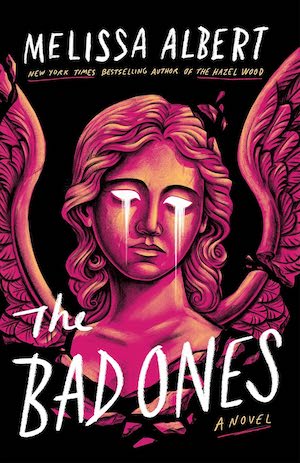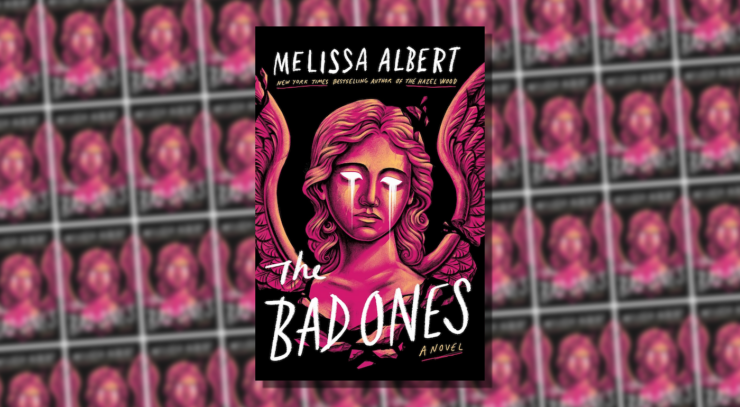One winter’s night, Four people in the town of Palmetto disappear: a troubled freshman, a mopey senior, a drunk teacher, and Nora’s best friend Becca. Nora doesn’t believe Becca ran away, nor that she could be the reason why the other’s are missing. For one, Becca isn’t the kind of girl to skip town (or is she?). For two, Becca doesn’t know any of those other people (except maybe she does?). For three, Nora keeps finding clues Becca left behind (clues to what? And why?).
As Nora digs into the disappearances, she realizes they’re all connected to a schoolyard rhyme about a wish-granting goddess all the local kids grow up singing. And then there’s the more grown-up version that teenagers play where one kid puts their life into the hands of another in an attempt to appease the goddess with the threat of life or death. Is the goddess real or a figment of childhood imagination? What if Becca thought she was real enough to try and summon her? What if something else answered?
The Bad Ones begins with the disappearance of several people and moves chronologically forward from that night, with flashbacks from Becca and Nora’s childhoods and the months leading up to the disappearances. Although the main story is first person from Nora’s perspective, the flashbacks are third person from Becca’s perspective. It’s a clever way to give the readers insight into Becca’s mind without pulling the focus away from Nora.
Melissa Albert writes in that nebulous zone between dark fantasy and horror. Her stories leave you unsettled and uncomfortable. They feel like a fairytale retold by the Grimm brothers. People die terrible deaths, innocents suffer great trials, and monsters inflict unspeakable tragedies. But through all of it is a thread of hope, not that things will get better but that you’ll survive. You may leave a piece of yourself behind or may be an entirely different person on the other end, figuratively or literally, but you will get through it.
Buy the Book


The Bad Ones
Nora holds onto that belief like a lifeline, even as it frays around her. Everything she thought she understood about Becca unspools with each loose thread she pulls. The Becca Nora knew was a quiet girl with a vengeful streak, a girl who was loyal to the point of pain and who turned to things she created as a way to control the chaos around her. The girl Becca becomes after losing both her parents is a creature Nora barely recognizes. She hardens and sharpens, becoming like the knife she gifts to Nora, becoming a thing to worry over and misunderstand. A girl like that doesn’t just disappear. So how to reckon that with the reality that Becca is gone? Which Becca was she? Was she both? Or was she a third version kept buried underneath the others?
Nora, too, is different versions of herself. She changes and is changed by her relationship with Becca. I think most people socialized as a girl in childhood go through a friendship that is so intense it tumbles into toxic. You feed each other and feed on each other. You are each others’ entire worlds, so much so that when the cracks begin to show, your friendship shatters and everything falls apart. Both of you must decide which version of each other you like more. Maybe you rebuild your friendship with a healthier foundation and maybe you sever ties permanently.
Albert offers teens a window into a collapsing friendship as well as the ways grief can compound into something twisted and dangerous if we don’t ask for help. This is also a story about adults who fail their charges, from teachers who cross boundaries to parents who relinquish parenting duties. It can feel so isolating as a teen with no adults willing to listen and a best friend who doesn’t see you for who you are (ask me how I know). I turned to daydreams, pouring my whole self into fantasies of other, better lives and other, better friends. If my town had a legend of a goddess who could grant you wishes and exact revenge, I probably would’ve worshiped her just like Nora and Becca did. When you’re young and desperate and full of feelings you don’t understand and don’t know what to do with, you make choices your adult self would scoff at.
The Bad Ones is another win for Melissa Albert. It’s a dark, beautiful story about friendship, grief, and truth. The monsters aren’t under your bed; they’re walking the streets and leaving damage in their wake.
The Bad Ones is published by Flatiron Books.
Read an interview with Melissa Albert.










